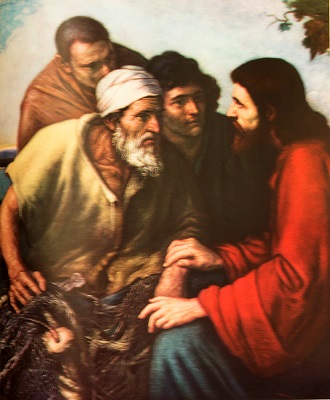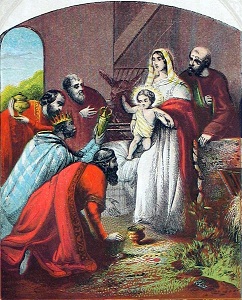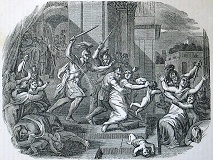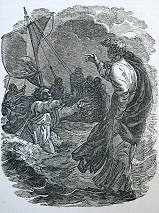Daily Bible Study Tips –
Matthew, Chapters 1 - 14
Overview of MatthewMatthew 1:18-25
Matthew 2:1-12
Matthew 2:13-23
Matthew 3:1-12
Matthew 3:13-17
Matthew 4:1-11
Matthew 4:12-17
| Random Walk in a Gallery of Religious Art, Step 51: Matthew 4:18-25, Jesus and the Fishermen, lithograph by Ernst Zimmerman |
Matthew 5:1-12
Matthew 5:21-37
Matthew 5:38-42; Romans 12:17-21
Matthew 6:6, 14:23; 1 Kings 19:9-12
Matthew 6:24-34
Matthew 7:21-29
Matthew 9:1-8
Matthew 9:35-10:8
Matthew 10:24-39
Matthew 11:2-11
Matthew 13:1-9, 18-23
Matthew 13:24-30, 36-43
Matthew 14:13-21
Matthew 14:13-21, Feeding of the 5000, not to mention the 4000
Matthew 14:22-33
Matthew, Chapters 15 - 28
Copyright information, disclaimers, and sponsors
Return to homepage
Matthew 1:18-25
Have you been getting a lot of deliveries? I got three packages and two Christmas cards today. It's great to hear from my friends, but the people delivering the messages are working hard. You probably know that "angel" means "messenger." The messengers were busy at the first Christmas, just as they are today. Six visits from angels are recorded in connection with the birth and early childhood of Jesus: to Zechariah saying that he and Elizabeth would have a son, the forerunner of the Messiah; to Mary saying she would have a son; to Joseph telling him he should go ahead with the wedding; to the shepherds telling them to zip into town and see the new baby; to Joseph telling him to grab the boy and his mother and get out of town; and to Joseph telling him it was okay to return from Egypt.
Matthew 2:1-12
Paul sums up the great mystery of Christmas – and indeed of the Christian faith – when he says that Jesus "according to the flesh was a descendant of David, and ... according to the spirit of holiness was declared to be the Son of God." See also Romans 1:1-7
Matthew 2:13-23
Matthew 3:1-12
Some scholars debate about what language Jesus used for teaching. (Don't ask me why.) The chief candidates are Aramaic (a descendant of Hebrew) and Greek. The Jews loved puns and wordplays, and Old Testament Hebrew is full of them. So one approach scholars use is to see whether the puns and other wordplays work in Aramaic and not in Greek or vice versa. Matthew 3:9 is one of the verses used (although John the Baptist is speaking, not Jesus). It's just a plain statement in English, and the Greek is equally plain. In Aramaic or Hebrew, however, you can make a pretty decent pun by choosing words for stones and descendents that sound similar to Abraham. Does this prove anything? Not really, because you can also choose valid words that don't sound like Abraham. Does it matter? Not at all, in this case. The message is just as clear without the pun as with. Let the scholars do their thing, and read contently.
Matthew 3:13-17 (1/11/2008)
That fiery prophet John is preaching and baptizing in the wilderness. Thousands of people come from Jerusalem and the rest of the country to be baptized for repentance. One of those coming to be baptized is Jesus--who has no need to repent. When John objects, Jesus responds that it is "fitting for us to fulfill all righteousness." I have always assumed that the "righteousness" in question is that the king of Israel is theoretically selected by God and anointed by God's prophet, a view that I think is supported by Jesus' statement in Luke 7 that "Elijah has come" in the person of John the Baptist (Matthew 11, Mark 19).
See also the Reader Question on Anointing.
Matthew 4:1-11
Why study scripture? Isn't it just about a whole bunch of people who lived a long time ago and have problems so different from today's modern world that it's of no application to us? After Jesus was baptized, he had to make some choices about his ministry. He was – really and truly – tempted by some of the options. He could have been a flashy miracle worker, winning the crowds by satisfying their physical hunger. Instead he decided to satisfy their spiritual hunger. He could have made himself invincible. Instead he decided to be a fragile human being. He could have taken over the world. Instead he decided to redeem the world.
For guidance in making these decisions, Jesus turned to the scripture that he had previously studied. "Man shall not live by bread alone..." is quoted from Deut. 8:3. "You shall not tempt the LORD your God" is quoted from Deuteronomy 6:16. "You shall worship the LORD your God..." is quoted from Deut. 6:13. The scripture can give you guidance on every difficult decision you have to make, but only if you have studied it in advance.
Matthew 4:12-17
Some friends and I were talking about how many houses we and others had lived in growing up. One example was a man who was born and then died as a very old man in the same bedroom of the same house, having shared that bedroom with his wife all during their marriage. Others, like my mother and I, have lived in so many places that we aren't sure we remember them all. We often forget that Jesus lived in a house in Bethlehem when he was a toddler, in Egypt when he was a child, and in Nazareth as a youth and young adult. For a time during his itinerant ministry, he did not have a home to call his own. At one point he had a house in Capernaum. We saw last week that he first talked to Andrew, Peter, Philip, Nathaniel, and probably John during the first few days after his baptism. But it was while he was living in Capernaum that he called them to come with him into active discipleship.
Note that in verses 15 and 16 Matthew quotes from the Old Testament. Matthew is sometimes referred to as the Gospel to the Jews, because he makes a considerable effort to establish through OT quotations that Jesus is the prophesied Messiah.
Random Walk in a Gallery of Religious Art, Step 51: Matthew 4:18-22, Jesus and the Fishermen, lithograph by Ernst Zimmerman (8/10/15)
|
Here’s another picture I like for the intensity of Jesus’ concentration on the people he’s with. Notice that even though Peter, Andrew, James, and John believe they are in the presence of the Lamb of God, no one is texting someone who isn’t there. Jesus and the Fishermen, by Ernst Zimmerman, shows us the moment in which Jesus tells these four men, “Follow me!” It’s no mystery why they immediately dropped everything to do so; remember that they had already met Jesus in Judea, while some of them were disciples of John the Baptist (John 1:35 and following). Previous Step. Next Step. |
 "Jesus and the Fishermen" by Ernst Zimmerman, from the Gamble family Bible, now in the private collection of Regina Hunter. Photography by Daryl Lee |
Matthew 5, 6, and 7
Matthew reported Jesus' Sermon on the Mount. Luke reported Jesus' Sermon on the Plane. The majority of scholars believe that this was the same sermon. They think the reports are so different because Luke put some stuff in from other sermons and took some stuff out of this sermon, and Matthew put other stuff in from other sermons and took other stuff out of this sermon.
Some scholars believe that there were two different sermons, that Jesus used some of the same material in both of them, and that Matthew and Luke reported what they heard. This sounds much more likely to me.
Matthew 5:1-12
Friends often ask whether reading the scripture in Greek gives me any new insights. I answer, hardly ever, because if you read a good modern translation with footnotes, if you read two or three different translations, or if you read commentaries, there aren't going to be many surprises in the Greek. One surprise to me (which is in the English, but I just never had a feel for it) is the enormous size of the crowds that followed Jesus. Thousands and thousands of people would congregate to hear him preach, to be healed by him, to see him, and just generally to be in his vicinity, because that's where all the action was. As far as drawing a crowd was concerned, Jesus was a rock star, movie star, sports hero, and presidential candidate all rolled up into one. So when you see the word "multitudes" or "crowds," don't think "dozens," think "thousands."
Matthew 5:21-37
Matthew 5, 6, and 7 make up the Sermon on the Mount. The bulk of the teachings in the Sermon are concerned with Christian behavior. Take a good look at Matthew 5:23-26. Many a time I have heard people report this as, roughly, "You should forgive anyone who has wronged you before you come to worship." While that may be true, it is not what these verses say. What they say is, "If you have wronged anyone, you should obtain forgiveness before you come to worship." It's not about whom you need to forgive, it's about whom you need forgiveness from.
Asking forgiveness is much more difficult than forgiving, because it requires us to admit that we were in the wrong. Maybe this difficulty is the origin of the completely unscriptural idea that we need to forgive people so that we can stop hating them. Excuse me? Hate is a sin (see vss. 21-22, 43-48). You don't forgive people that you hate: you stop hating them and then you ask both God and your former enemies for forgiveness.
Matthew 5:38-42; Romans 12:17-21 (9/30/11)
Often we don’t realize that the New Testament writers are quoting from the Old Testament. In Matthew 4:38, Jesus talks about the law of “an eye for an eye, and a tooth for a tooth,” which is first given in Exodus 21:24 and comes up again in Leviticus 42:20 and Deuteronomy 19:21. In Romans 12:19, Paul is quoting Deuteronomy 32:35, and in 12:20, he’s quoting Proverbs 25:21-22.
Wouldn’t it be cool if we were familiar enough with the scriptures to be able to use them in conversation? I’m not suggesting that you memorize verses and throw them in at random; I’m talking about being able to see that a particular passage is pertinent to a discussion and using it to shed new light on the topic at hand.
Matthew 6:6, 14:23; 1 Kings 19:9-12 (10/17/11)
Sometimes God speaks in a commanding, unmistakable voice. We see this especially in miracles, as in Exodus, during the plagues; in the ministry of Jesus, in miracles of healing; and in natural events, as described in many psalms. Other times, God’s voice is not so easy to recognize. We see many cases where only solitude and quiet allow us to hear God’s voice.
I think of God, especially in the person of the Holy Spirit, as being a lot like 24-hour radio. He’s always transmitting, but often I’m not receiving. Today we see three models for listening; all three involve solitude and quiet.
Matthew 6:24-34
We Americans are safer and healthier than we have ever been before (trust me on this--I'm a risk analyst). In spite of this, we are also more anxious than ever before, primarily because we trust news media that delight in telling us what danger what are in. In the Sermon on the Mount, Jesus says we should trust God and not be anxious, because God values us and knows what we need. Paul goes on to say, roughly, what's the worst that can happen? Even if you die, you will be raised imperishable and immortal! "Thanks be to God, who gives us the victory through our Lord Jesus Christ." See also 1 Corinthians 15:51-58
Matthew 7:21-29
Matthew 7:21-23 should be some of the most alarming verses in the Bible for believers. If you can't get into the kingdom of heaven by calling Jesus "Lord," or by preaching and exorcising demons and working miracles, how on earth can you get in?!
Pastor Charlie used to tell the story about the man who showed up at the Pearly Gates. St. Peter said he needed 100 points to be admitted. The man answered, "I went to church my whole life." Peter said, "Good! That's worth one point!" The man, somewhat taken aback, replied, "I also read my Bible every day." Peter said, "Great! That's another point!" Now the man was starting to worry a little, and he offered, "All my children are Christians." Peter said, "Wonderful! Now you've got three points!" By this time, the man was getting exasperated. He turned to the person behind him and muttered, "Well, I don't know how you're supposed to get into this place except by the grace of God!" Peter said, "Grace of God, 97 points! Go on in!"
Matthew 9:1-8 (9/28/11)
I’ve had two phone calls today. One was from a friend who had surgery this morning and called me from his own home about 2 p.m. The other was from a family member who’s been sick for a couple months, and so far no one can tell her why. Every day we pray for friends who are sick, and it’s a good idea to pray for their doctors as well.
Jesus cut out the middle man and healed the sick directly. In today’s reading, his reason is what’s interesting: he healed the paralytic, at least in part, for the benefit of the onlookers! Thank God for modern medicine, and thank God also for healing that occurs even without modern medicine!
Matthew 9:35-10:8
Jesus spent three years preparing his disciples to take over the ministry after he returned to heaven. He taught them through lectures and by example. He also used another teaching method – the practicum. He sent the disciples out on a practice run to apply in the real world what they had studied in the classroom. In today's reading we see the beginning of his instructions for their trip.
Matthew 10:24-39
Our reading from Matthew continues Jesus' instructions to his disciples as he sends them out on their work-study trip. Students often find that a real job has a lot of problems that didn't arise in the classroom, and Jesus warns his disciples that they will encounter difficulties.
Paul certainly encountered difficulties on his mission trips. One problem was that people would come to his churches when he was gone and and try to discredit him. He wrote "a letter of tears" to the Corinthians after one such occasion; although we do not have the entire letter, it is possible that this reading from 2 Corinthians is an excerpt from it. See also 2 Corinthians 6:1-13.
Matthew 11:2-11
Herod the tetrarch put John the Baptist in jail for saying (correctly) that Herod had sinned in marrying the ex-wife of his brother, who was still alive. From his prison cell, John sends a message to Jesus. It sounds to me like John is getting discouraged and wants to know whether he has thrown away his life. He, like many others, was convinced that Jesus was the coming Messiah, but so far not much seems to be happening. John wants to know, one way or the other. We saw earlier in the week that John and Jesus were intimately familiar with the prophecies of Isaiah. Instead of saying yes or no, Jesus tells John's disciples to tell John what they have experienced: the prophecies of Isaiah are being fulfilled in Jesus. It was too early to tell the crowds that he was the Messiah, but Jesus knew that John would understand the answer. Like his cousin Jesus, John the Baptist died young, executed by the authorities.
Matthew 13:1-9, 18-23
If Jesus explained the parable of the sower today, I sure this would be the gist of the thorn bushes: "The seeds that fell among the thorn bushes are also people who hear the message. But they start spending too much time watching TV. So the message gets choked out, and they never produce anything." Over the years, I've had quite a few people tell me that they didn't have time for Bible study. I know that the Nominating Committee always has trouble because people don't have time to serve on committees. The average American has less than an hour a week for reading the Bible – although that's among people who read the Bible at all, and lots of people don't. Nevertheless, the average American has time for more than four hours per day of television. As you read the parable of the sower, I hope you identify with the people who hear the word and produce a hundred or sixty or thirty times what was planted, and not with the people who are lost on the thorn bushes.
Matthew 13:24-30, 36-43
Our reading from Matthew is later in the same chapter as the Parable of the Sower, and in fact it is the dark side of that parable. Just as the Sower sows good seed, so also the Enemy sows bad seed. We often wonder why God permits evil people to live in the world along with the rest of us. Why doesn't he just eliminate the bad people right now and have done with it? Then the rest of us (because obviously we would not be the ones eliminated!) could get on with our lives, untroubled by evil. Today's parable explains why: prior to the harvest, it's difficult to tell good from bad – the particular weed referred to in the scripture is very difficult to tell from wheat before the two plants are mature. In addition, they can be planted so close together that pulling a weed might destroy some of the wheat, and we know that this is true of bad and good people as well. I try to remember this parable whenever it seems to me that the world would be better off without somebody. If God isn't yet ready to judge them, perhaps I should hold my peace.
Matthew 14:13-21
Sometimes it still amazes me (although at my age it never should) how often you can pick two scriptures more or less at random and find that they are closely related in theme. We see two such scriptures today. The Messianic banquet described in all four gospels has its roots deep in the Old Testament. Note the common elements of people coming to the Lord from all over, being in the desert far from town, and being hungry, and the graciousness of the Lord in providing food. As an aside, note that the crowd must have been in the neighborhood of 15,000 people. See also Psalms 107:1-9, 43.
Matthew 14:13-21, Feeding of the 5000, not to mention the 4000
Matthew, Mark, and Luke are called the "Synoptic Gospels." "Synoptic" is from the Greek words "with" and "eye," and this label is usually explained by saying either that these three Gospels all take the same point of view or that you can line them up side by side and look at them all at once. Both explanations are more-or-less true.
Matthew and Luke do differ in fairly systematic ways from Mark, which was written first. "The Feeding of the Five Thousand" doesn't illustrate any of the systematic differences, strangely enough. Mark is a brief, action-packed, straightforward gospel, and when Mark and Luke change Mark's story, they tend to add details to it that they remembered on their own or got from other sources. Mark's version of this particular story, however, is about half again as long as Matthew's and Luke's. For the material that they take from Mark's gospel, Matthew and Luke most often use Mark's exact words, although in the story "The Feeding of the Five Thousand," they don't. Another difference between Mark and the other two, which you also can't see in this story, is that Matthew and Luke tend to suppress details in Mark that apparently make Jesus seem to them to be "ordinary." For example, in reporting Jesus' healing of the man with a withered hand, Mark says that Jesus looked around at the Pharisees "with anger, being grieved" (Mark 3:5), but Luke says only that he "looked around" at them (Luke 6:10), and Matthew doesn't say (Matthew 12:12-13).
When you are interested in an event, you read the newspaper, watch TV, and follow up with a weekly news magazine to get the "whole story." If you want to get the grown-up version of a Bible story that is told more than once, you need to read it in all three of the Synoptic Gospels. See also Luke 9:9-17, John 6:1-14.
Matthew 14:22-33
Copyright 2007, 2008, 2009, 2010, 2011, 2013, 2015, 2016 by Regina L. Hunter. All rights reserved.
Opinions expressed on this page are solely those of the author, Regina Hunter, and may or may not be shared by the sponsors or the Bible-study participants. Thanks to the Holy Spirit for any useful ideas presented here, and thanks to all the readers for their support and enthusiasm. All errors are, of course, the sole responsibility of the author.
Our Sponsors:
St. John's United Methodist Church, "Transforming Lives Through Christ."
2626 Arizona NE, Albuquerque, New Mexico 87110
St. John's Music Ministries now has a YouTube channel, bringing you free concerts and choral music. Check it out!
Traditional worship services are held Sundays at 8:15 and 11:00 a.m. in the sanctuary. Casual worship services are held Sundays at 9:30 a.m. in the Family Life Center. Jazz Vespers are held monthly on the second Saturday at 5:00 p.m. in the sanctuary. St. John's feels especially called to the worship of God and to the service of our neighbors through our music program.
Storm Dragon SoftwareTM
Ducks in a Row, Inc.
This website is supported in part by the generosity of Mrs. J. Jordan.


